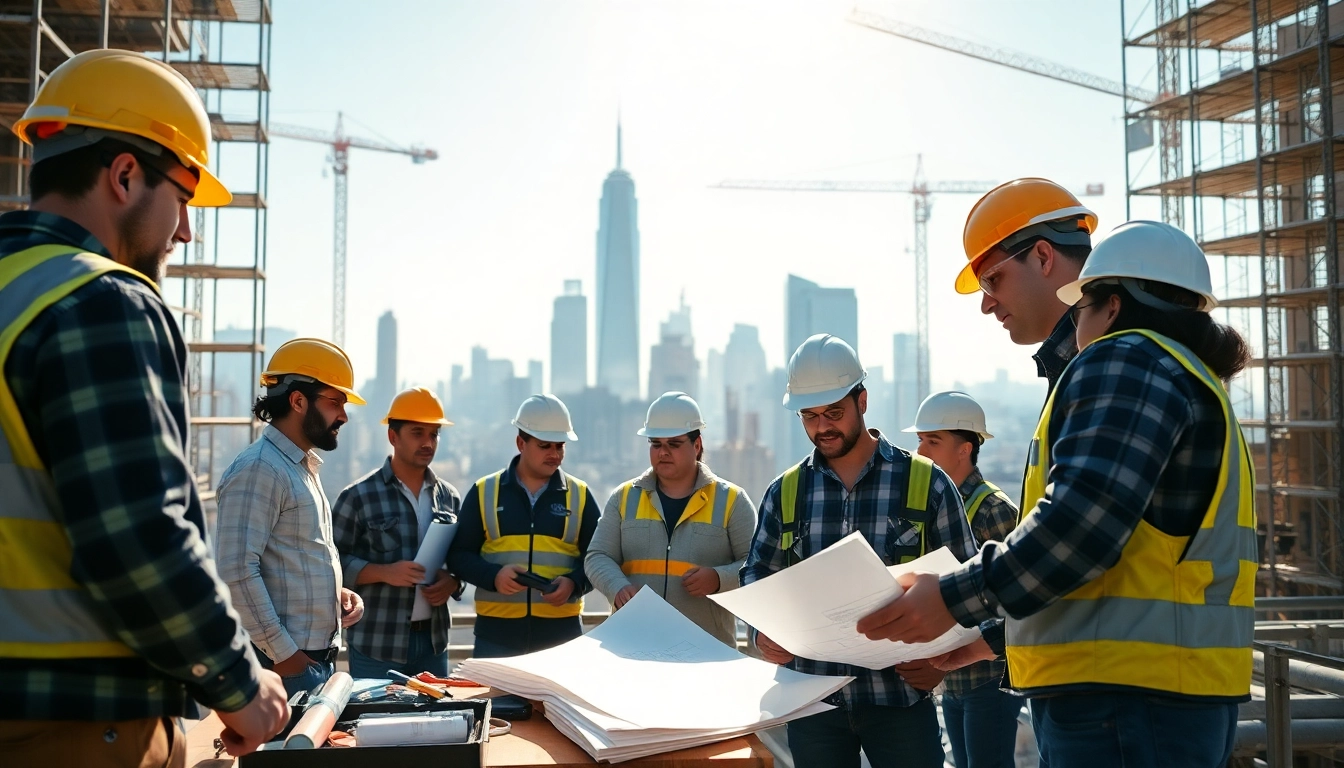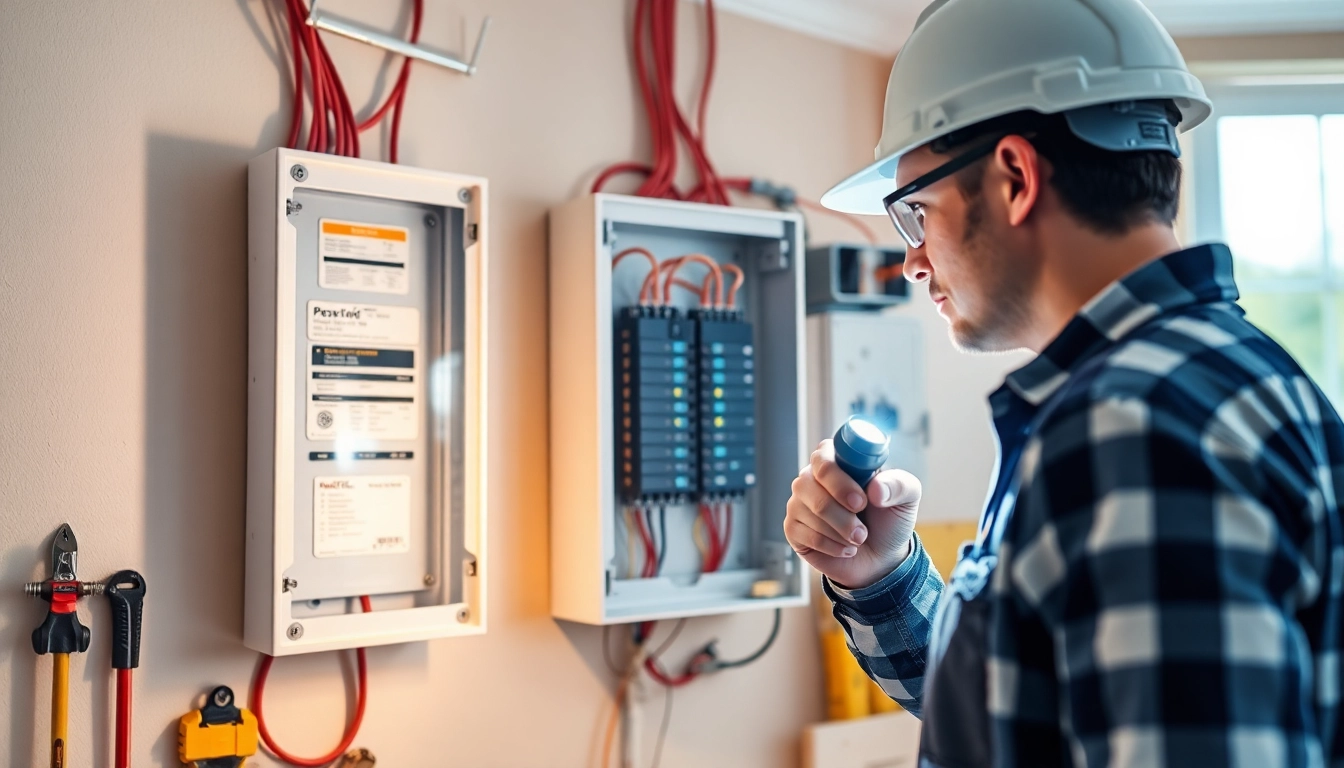Understanding the Role of a New York Commercial General Contractor
Definition and Key Responsibilities
A New York Commercial General Contractor serves as a primary point of contact for managing construction projects. Their role encompasses a diverse array of responsibilities, including project management, budgeting, scheduling, and the coordination of subcontractors. The contractor is responsible for ensuring that a project adheres to its timelines, stays within budget, and meets quality standards specified by the client. In a city as dynamic and regulated as New York, these responsibilities gain additional layers of complexity, making the contractor’s expertise invaluable.
Why Hiring a General Contractor Matters for Your Project
When embarking on a commercial construction project, hiring a New York Commercial General Contractor proves crucial. They not only bring specialized knowledge and experience to the table but also facilitate smoother project execution. A skilled contractor can navigate the intricate landscape of regulations, zoning laws, and building codes unique to New York City, eliminating potential delays and disputes.
Furthermore, a commercial general contractor understands the local market conditions and can anticipate challenges before they escalate. This foresight is critical in managing risks associated with cost overruns, project timeline delays, and compliance issues. Ultimately, an experienced contractor enhances your project’s likelihood of success, ensuring that the final outcome aligns with your vision.
Common Misconceptions about General Contractors
There are several misconceptions surrounding the role of general contractors that can lead to misunderstandings and poor hiring choices. One prevalent misconception is that general contractors only manage labor and do not have a significant role in the project’s planning stages. In fact, a general contractor plays a critical role right from the planning phase, providing input based on their knowledge of materials, timelines, and potential challenges.
Another misconception is that more expensive contractors guarantee higher quality work. While budget does play a role in determining the caliber of work, it is not the sole indicator. There are many factors to consider when assessing a contractor’s reliability, such as past performance, communication skills, and customer reviews.
Identifying the Right New York Commercial General Contractor for Your Needs
Evaluating Experience and Expertise
The first step in hiring the right contractor for your project involves thoroughly evaluating their experience and expertise. Consider the nature of your project—whether it’s a renovation, new construction, or a specialized build—and assess whether the contractor has relevant experience in similar projects. A contractor well-versed in your specific type of construction will possess a deeper understanding of the pitfalls and nuances involved.
Moreover, request case studies or examples of completed projects. This will give you insight into their work ethic, problem-solving skills, and ability to deliver on promises. Look for contractors who proactively provide solutions rather than merely pointing out problems; this proactive approach is a telltale sign of a strong professional.
Important Credentials to Look For
Credentials can provide assurance that a contractor operates with a level of professionalism and expertise. First and foremost, verify that the contractor is licensed and insured. These credentials not only protect you as the client but also suggest that the contractor adheres to industry regulations and practices safety measures on site.
Additionally, consider certifications from recognized industry organizations. Membership in professional associations often indicates a commitment to continuous learning and improvement, which can translate into better project execution. Look for certifications such as being a LEED accredited professional, which demonstrates expertise in sustainable construction practices.
Assessing Quality of Past Projects
One of the most effective ways to gauge a contractor’s capabilities is by assessing the quality of their past projects. This evaluation can include site visits to finished projects or reviewing portfolios that showcase their work. Pay attention to the aesthetics, quality of finishes, and adherence to project timelines in past projects.
Moreover, references from previous clients can offer invaluable insights into the contractor’s work ethic. Reach out to these references and inquire about their overall experience, communication style, and whether they encountered any challenges during the project. A contractor with a strong reputation and positive references is likely to deliver similar outcomes for your project.
The Process of Working with a New York Commercial General Contractor
Initial Consultation: What to Expect
The initial consultation serves as a critical foundation for your project’s success. During this meeting, you should outline your vision, budget, and timeline. A reputable general contractor will come prepared with questions aimed at understanding your specific needs. They may inquire about necessary permits, design preferences, or special materials to help tailor the project accurately to your requirements.
Prepare to discuss potential challenges and budget constraints openly. A transparent conversation will foster a collaborative spirit and set expectations for the relationship going forward. Expect the contractor to offer initial insights based on your discussion, as their experience can illuminate possible pitfalls that you may not have considered.
Contract Negotiation: Key Points to Consider
The contract negotiation phase is vital in ensuring that both parties have clear expectations about the project’s scope, timeline, and costs. Be prepared to discuss essential aspects of the contract, including payment terms, milestones, and change orders. Understand how additional work requests or changes to the project scope will be handled and compensated.
It’s also crucial to clarify what happens if issues arise during construction. Will there be penalties for project delays? How will disputes be resolved? A robust contract will outline these scenarios, reducing ambiguity and potential conflict down the line.
Communication Throughout the Project
Clear communication is the linchpin of a successful construction project. Establishing communication protocols at the outset ensures that everyone is on the same page. Regular progress updates should be a standard practice, whether through scheduled meetings, emails, or site visits.
Also, identify the primary points of contact for both parties—yourself and the contractor’s project manager. Open lines of communication can foster trust and facilitate quicker resolution of issues that may pop up throughout the project’s life cycle.
Challenges in Commercial Construction and How to Overcome Them
Budgeting and Cost Management Strategies
Budgeting is often one of the most significant challenges in commercial construction. To avoid exceeding budget constraints, create a detailed project budget that accounts for materials, labor, permits, and contingency funds. A typical recommendation is to allocate 10-15% of your total budget for unexpected costs, providing a cushion should challenges arise.
Throughout construction, refrain from making impulse purchases or unplanned changes that can deplete your budget. Regularly review expenses with your contractor to ensure the project remains financially viable. This proactive approach helps in maintaining accountability and transparency.
Handling Delays and Unexpected Issues
Delays and unexpected issues are commonplace in construction projects, particularly in a complex urban setting like New York. Factors such as weather, supply chain disruptions, or even unforeseen structural challenges can hinder progress. To mitigate the impact of these issues, maintain a flexible schedule that can accommodate potential delays.
Regularly communicate with your contractor regarding the project timeline and status updates. When delays are anticipated, working together with your contractor to devise solutions early on can prevent these challenges from derailing the entire project.
Maintaining Quality Control
Quality control is crucial in ensuring that the construction meets both your standards and regulatory requirements. Establishing quality control measures at the outset can ensure that construction adheres to agreed-upon specifications. Regular inspections and walk-throughs can help catch issues before they escalate, ensuring that the project remains aligned with the quality expectations set in the contract.
Engage in continuous dialogue with your contractor, discussing quality concerns openly as they arise. Clear and constructive feedback can significantly enhance the final outcome, leading to a more satisfying result and potentially avoiding costly corrections later on.
Measuring the Success of Your Project With a New York Commercial General Contractor
Defining Success Metrics for Your Construction Project
Measuring the success of your construction project requires clarity on what metrics are most important. Common success metrics include adherence to budget, timeline accuracy, quality of work, and client satisfaction. Clearly define these metrics during the planning phase, ensuring that both you and your contractor have aligned expectations.
Requests for feedback at various stages of the project can help identify whether your performance metrics are being met. You can adjust your strategy accordingly if early indicators show that the project is veering off course.
Post-Construction Evaluation and Feedback
Once the project is completed, conducting a post-construction evaluation is essential to gauge overall success. This evaluation should include an assessment of the project against the defined success metrics. Questions you might consider include: Did the project meet its budget and timeline? Were the quality standards upheld? What challenges were encountered, and how were they addressed?
Asking for feedback from your contractor also provides insights into what worked well and what could be improved in future projects. This dialogue can strengthen the working relationship and lay the groundwork for potential collaborations down the line.
Building a Long-Term Relationship with Your Contractor
Lastly, maintaining a long-term relationship with your contractor can provide lasting benefits for future projects. Building rapport enables smoother communication and understanding, leading to more effective collaborations. Keep channels open even after project completion, potentially collaborating on future opportunities or utilizing their expertise as a trusted advisor.
Consider nurturing this relationship through regular updates on your business endeavors, inviting them for project discussions, or even referring them to others in need of similar services. A solid partnership can yield fruitful benefits for both parties in the long term.




